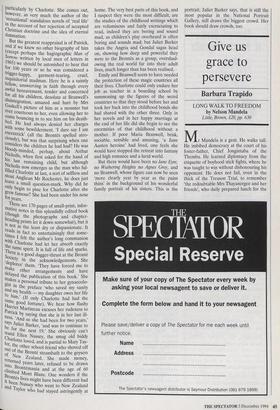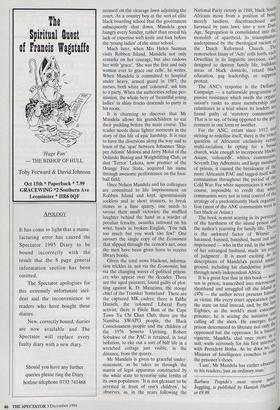Give us grace to persevere
Barbara Trapido
LONG WALK TO FREEDOM by Nelson Mandela Little, Brown, £20, pp. 630 Mr Mandela is a gent. He walks tall. He imbibed democracy at the court of his foster-father, Chief Jongintaba of the Thembu. He learned diplomacy from the etiquette of boyhood stick fights, where he was taught to win without dishonouring his opponent. He does not fail, even in the thick of the Treason Trial, to remember `the redoubtable Mrs Thayanergee and her friends', who daily prepared lunch for the accused on the vicarage lawn adjoining the court. As a country boy at the sort of elite black boarding school that the government subsequently shut down, Mandela goes hungry every Sunday, rather than reveal his lack of expertise with knife and fork before the 'young ladies' of the sister school.
Much later, when Mrs Helen Suzman visits Robben Island, Mandela not only remarks on her courage, but also endows her with 'grace'. 'She was the first and only woman ever to grace our cells', he writes. When Mandela is committed to hospital under heavy, armed guard in 1987, the nurses, both white and 'coloured', ask him to a party. When the authorities refuse per- mission, the whole bevy of 'beautiful young ladies' in shiny frocks descends to party in his room.
It is charming to discover that Mr Mandela allows his grandchildren to eat their pudding before the main course. The reader needs these lighter moments in the story of this life of epic hardship. It is nice to have the diversions along the way and to learn of the 'spat' between Johannes 'Skip- per Adonis' Molotsi and Jerry Moloi of the Orlando Boxing and Weightlifting Club, or that 'Terror' L,ekota, now premier of the Orange Free State, acquired his name through awesome performance on the foot- ball field.
Once Nelson Mandela and his colleagues are committed to life imprisonment on Robben Island and kept, ignominiously sockless and in short trousers, to break stones in a lime quarry, one needs to savour their small victories; the muffled laughter behind the hand as a warder of peculiar ferocity, swastika tattooed on his wrist, bawls in broken English, 'You talk too much but you work too few!' One savours the single copy of the Economist that slipped through the censor's net, once the men have been given leave to receive library books.
Given the total news blackout, informa- tion trickles in, not via the Economist, but via the changing waves of political prison- ers who appear over the decades. There are the aged peasants, found guilty of plot- ting against K. D. Matazima, the stooge chief of the Transkei 'homeland'. There are the captured MK cadres; there is Eddie Daniels, the 'coloured' Liberal Party activist; there is Fikile Bain of the Cape Town Yu Chi Chan Club; there are the Namibia SWAPO people, the Black Consciousness people and the children of the 1976 Soweto Uprising. Robert Sobukvve of the PAC is retained, in total isolation, to eke out a sort of half life in a wretched cottage just visible, in the distance, from the quarry.
Mr Mandela is given to graceful under- statement, as he takes us through the matrix of legal apparatus constructed by the white state to terrorise nine tenths of its own population. 'It is not pleasant to be arrested in front of one's children', he observes, as, in the years following the National Party victory in 1948, black South Africans move from a position of being merely landless, disenfranchised and harassed by pass laws, into a new Dark Age. Segregation is consolidated into the monolith of apartheid, its triumphalign underpinned by the theological racism of the Dutch Reformed Church. The remorseless litany of 'Acts' rolls forth, each Orwellian in its linguistic inversion, each designed to destroy family life, bulldoze areas of black domicile, retard black education, gag leadership, or supPress protest. The ANC's response is the Defiance Campaign — a nationwide programme of passive resistance which swells the orgalt sation's ranks to mass membership an' culminates in a trial where its leaders are found guilty of 'statutory communism That is to say, of being opposed to the go' ernment in one form or another. For the ANC, extant since 1912 and striving to redefine itself, there is the vexed question of Africanist exclusivity versus multi-racialism. In opting for a broad church, wide enough to incorporate blacks, Asians, 'coloureds', whites, communists, Seventh Day Adventists and large numbers of priests, it caused the breakaway of rhe more Africanist PAC and tagged itself With communism throughout the period of the Cold War. For white supremacists it was, of course, impossible to credit that white communists were not in total control of the strategy of a predominantly black orgarlis' tion (most of the ANC communists were fact black or Asian.) The book is most searing in its portraYa; of the harshness of the island prison an the author's yearning for family life. There is the awkward factor of Winnie harassed, banned, banished, burnt out all' imprisoned — who in the end, in the words of her estranged husband, made 'an error of judgment'. It is most exciting ill it5 descriptions of Mandela's period under' ground, including his clandestine jour' through newly independent Africa.
It is a great feat that in this book — ten in prison, transcribed into microscoP! shorthand and smuggled off the island If 1976 — the author never presents hiniset, as victim. His every court appearance Ie the state on trial instead, and, by the Into Eighties, as the world's most esteerned prisoner, he is seizing the initiative calling all the shots. He emerges fOre prison determined to liberate not only oppressed but the oppressor. In a bizarr; vignette, Mandela, clad once more in w suit, waits nervously for his first interoc,e tie Minister President Botha. As he does so, n'te Minister of Intelligence crouches to 1' the prisoner's shoes. ed 'I am', Mr Mandela has earlier obsellf to his readers, 'just an ordinary man.' Barbara Trapido's most recent Orl"ne aJ Juggling, 9 gig91. i9ng, , is published by Hamish Harni""











































































 Previous page
Previous page